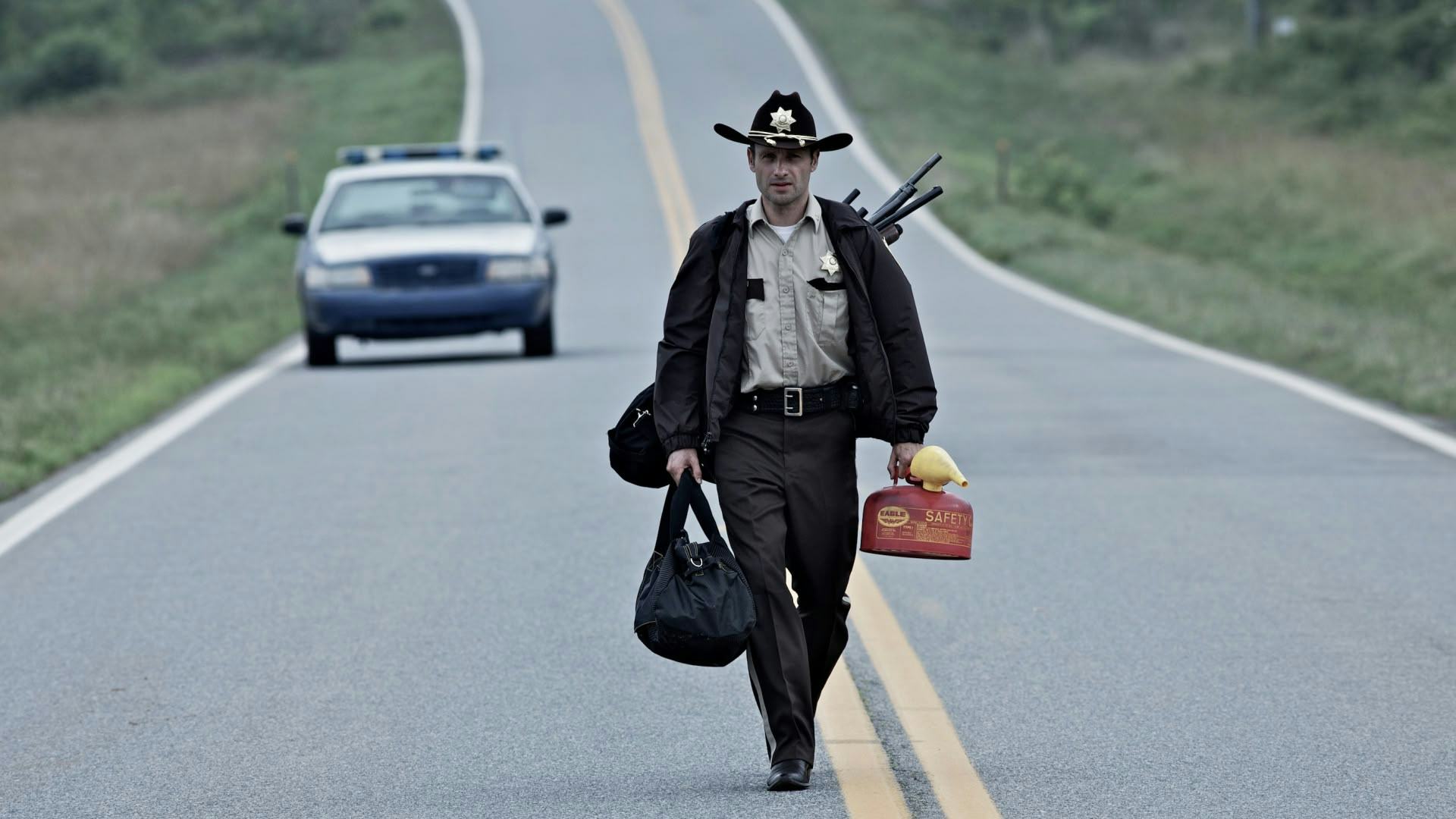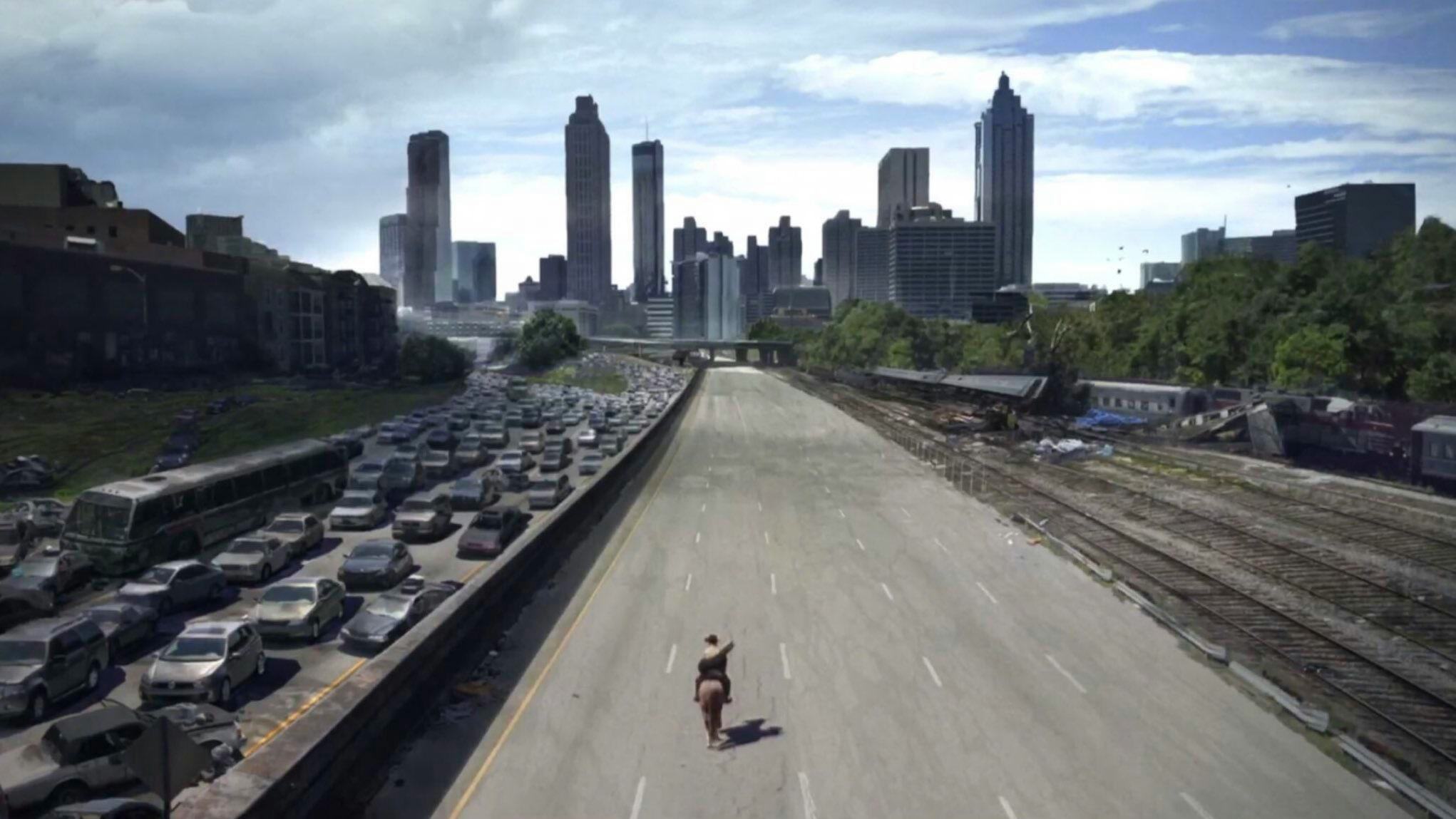
To date, AMC’s The Walking Dead, itself based on a successful, long-running comic, has amassed one main series, five spin-off series, an anthology series, multiple web series, several video games, and a post-show commentary series. That’s not even mentioning the sheer amount of merchandise that’s been spun out of the zombified saga. It’s become one of the most famous TV franchises in history, which makes revisiting its patient and melancholic pilot all the more surprising. Titled “Days Gone Bye,” and airing 15 years ago today, it’s not only a great premiere but a crucial piece of the zombie genre. And it contains a lonely atmosphere that The Walking Dead would never be allowed to return to.
The opening follows the first comic issue: deputy Rick Grimes wakes up alone in a hospital, having been comatose during the early days of the zombie apocalypse. It’s akin to the beginning of 2003’s 28 Days Later, but considering that both film and comic debuted within months of one another in the United States, it’s likely horror cross-pollination (and 28 Days writer Alex Garland was inspired by an even earlier “man gets out of hospital to find terrible changes” effort, 1951’s The Day of the Triffids). From there, Grimes begins his sad trek across Georgia and uncovers the reality of a world that quite literally devoured itself.
While much of modern zombie media is concerned with the chaos that would occur in the immediacy of the outbreak, the strength of “Days Gone Bye” is that it’s set after the rot has settled in. The shambling, crawling corpses that Grimes encounters are borderline hallucinatory reminders of all that he’s lost, and much of the episode plays out in fever dream fashion. Even when Grimes finds the widower Morgan and his young son Duane, who help explain what went down while Grimes was comatose, it does little to affirm any concrete reality. Later, when Morgan draws out other zombies with gunfire in a vain attempt to “put down” his zombified wife, he finds he can’t pull the trigger on her. Emotional desperation and raw primal urgency have replaced any sense of rationality.
As time passed, the show’s exponentially growing cast, constant gory upgrades, and constant blunt reminders that mankind is an even more dangerous enemy than the undead would remove this desolate tone. At one point, deep into the show’s fifth season and having committed and witnessed multiple lifetimes’ worth of atrocities, Rick announces that “we are the walking dead,” an essential fugue state that allows for their continued survival. But in its most literal terms, Rick is never more walking dead than he is in the premiere, as he shuffles, as pale as the zombies he flees, into the emptiness. Toward the end, surrounded by a horde in downtown Atlanta, he begins to accept his demise. It’s the way of all things now.
Andrew Lincoln, who plays Rick Grimes with such wide-eyed trauma that he looks to be on the verge of actually passing out multiple times, does a great deal of the heavy lifting. But one would be remiss to exclude the contributions of the episode’s director and writer (and then showrunner) Frank Darabont. Darabont was eventually fired from the show under acrimonious circumstances, but he lends “Days Gone Bye” the kind of invested sorrow that he provided films like The Green Mile and The Mist. In his hands, familiar visual zombie tropes, like a devastated household, become totems for spiritual extinction.

Of course, The Walking Dead would change. At the end of the episode, Rick gets in touch with a group that includes his wife and son, and that he’s destined to lead. It had a snowball effect on the way the series worked, and while certain members of the ensemble stood out (Norman Reedus’ redneck loner Daryl Dixon became such a fan-favorite that he got his own self-titled spin-off), it’s hard not to view “Days Gone Bye” as a singular exercise in the entire project. It’s almost a one-man show about waking up with only the barest, wandering narrative to follow. Without kinship or structure or familiar culture, how does one keep going?
The Walking Dead, as it attempts to balance the aforementioned “we are the walking dead” attitude with the inherent comforts that come with building community and the plot-driven activities provided by conflict, loss, and love, has never been able to answer that. “Days Gone Bye,” though, seems to indicate that you simply keep going until you don’t. After the zombie apocalypse, the survivors stripped themselves of their old interests and attachments and became vessels of anguish, knowing that the days gone by are days you will never get back.







